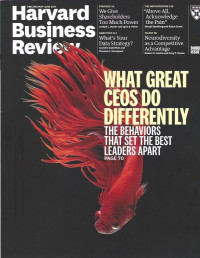
Text
Harvard Business Review: Vol. 3 May - June 2017
It’s pretty much a given in modern capitalism that managers’ top priority is maximizing value for shareholders. So when we publish articles about how to create a sustainable, long-term business, we sometimes get pushback from executives of publicly listed companies. They say the goal is admirable, but real-world pressures require them to put shareholder returns first. Anything else is secondary. But what if the assumption underlying that thinking is wrong? What if it’s built on a debatable, perhaps even incorrect, interpretation of the law? These are some of the provocative questions put forth in this month’s lead Spotlight article by Harvard Business School professors Joseph Bower and Lynn Paine: “The Error at the Heart of Corporate Leadership.” The idea of shareholder primacy is relatively recent and is rooted in the agency theory laid out by academic economists in the 1970s in articles in HBR and elsewhere. Simply put, the notion is that shareholders own the corporation and, by virtue of that, have the ultimate authority over its business. Bower and Paine demonstrate the flaws in the theory, particularly its inability to deal with the “accountability vacuum” that arises because shareholders—many of whom are merely short-term investors—have no real responsibility to the companies whose stock they own. The authors argue that the current orthodoxy is an “extreme version of shareholder centricity” that is “confused” as a matter of law and harmful to society. It forces executives to focus excessively on the short term, weakening companies’ long-term prospects and damaging the overall economy. A better approach, they say, would have at its core the health of the company, not the near-term gains of shareholders. Corporations are independent entities endowed by law with the potential for indefinite life. With good leadership, they can serve markets and society over long periods of time.
The containts of this series talking about:
1. How Venture Capitalists Really Assess a Pitch
2. Sometimes, Less Innovation is Better
3. Reclaim Your Commute
4. State Street’s CEO on Creating Employment for At-Risk Youths
5. Spotlight on Managing for the Long Term
6. What Sets Successful CEOs Apart
7. Onboarding isn’t Enough
8. The Talent Curse
9. Neurodiversity as a Competitive Advantage
10. The Problem with Product Proliferation
11. What’s Your Data Strategy?
12. The World’s Next Great Manufacturing Center
13. Linear Thinking in a Nonlinear World
14. Above All, Acknowledge the Pain
15. Competing Against Bling
16. Life’s Work: Alice Waters
Ketersediaan
| B00310 | 650.05 HAR | My Library | Tersedia |
Informasi Detail
- Judul Seri
-
-
- No. Panggil
-
650.05 HAR
- Penerbit
- Boston, Massachusetts : Harvard Business Review Press., 2017
- Deskripsi Fisik
-
p. 1-176 : illustration; 27 cm.
- Bahasa
-
English
- ISBN/ISSN
-
073361648037
- Klasifikasi
-
650.05
- Tipe Isi
-
text
- Tipe Media
-
unmediated
- Tipe Pembawa
-
volume
- Edisi
-
Vol. 3 May - June 2017
- Subjek
- Info Detail Spesifik
-
-
- Pernyataan Tanggungjawab
-
The views expressed in articles are the author's and not necessarily those of Harvard Business Review.
Versi lain/terkait
Tidak tersedia versi lain
Komentar
Anda harus masuk sebelum memberikan komentar
 Karya Umum
Karya Umum  Filsafat
Filsafat  Agama
Agama  Ilmu-ilmu Sosial
Ilmu-ilmu Sosial  Bahasa
Bahasa  Ilmu-ilmu Murni
Ilmu-ilmu Murni  Ilmu-ilmu Terapan
Ilmu-ilmu Terapan  Kesenian, Hiburan, dan Olahraga
Kesenian, Hiburan, dan Olahraga  Kesusastraan
Kesusastraan  Geografi dan Sejarah
Geografi dan Sejarah  E-Book
E-Book